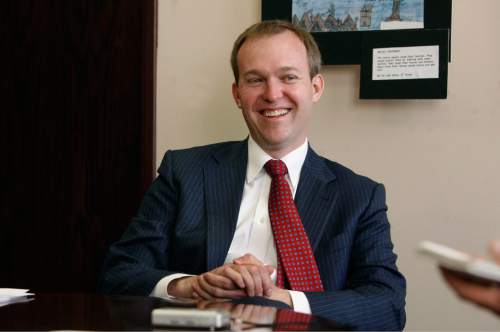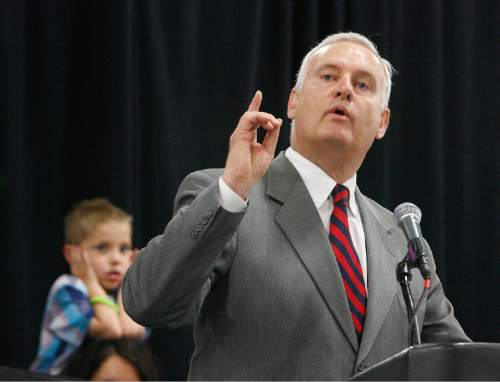This is an archived article that was published on sltrib.com in 2015, and information in the article may be outdated. It is provided only for personal research purposes and may not be reprinted.
Salt Lake County Council members will take one last shot Tuesday at trying to limit the impacts of — what to call it? — a tax increase or a tax continuation.
The question arises over Mayor Ben McAdams' proposal to keep collecting $9.4 million that comes in annually from an expiring bond that county voters approved in 1995 to expand the jail.
His plan is to set aside $5.5 million of that revenue this year for a long-term approach to dealing with a growing crisis in the criminal-justice system, while using $3.9 million for immediate needs, largely in the sheriff's office and the district attorney's office.
McAdams said he believes the public will support this extension because it is addressing criminal-justice needs, just as jail construction did previously, and doing it with minimal pain for taxpayers.
With this continuation, the mayor's $1.1 billion county budget would boost taxes by $2.28 per year for the owner of a $273,000 home, and $4.15 per year for a business property worth the same amount.
"The only ones not calling it a tax increase are in the echo chambers of this room," said Council Chairman Richard Snelgrove, a Republican. "It's a tax increase."
If the tax levy was scrapped, he noted, those owners of $273,000 homes would have an extra $18 in their pockets.
"When it comes to the issue of burdening our citizens with a tax increase, we should not be hasty," Snelgrove said, citing a letter he got from an elderly woman living on a fixed income. "Let's look elsewhere for cuts before we hit our people up with a tax increase."
He got support at the County Council session from Sandy resident Steve Van Maren, a regular council attendee.
Rather than putting the $5.5 million in escrow while McAdams tries to persuade the County Council early next year that "Pay for Success" is the way to go, Van Maren said the county should return that money to taxpayers.
"You can add it back in if you have a good plan to give to the public," he said. "Now it's just money looking for a use. If you can narrow it down better, the public will accept it better."
So Snelgrove and Councilwoman Aimee Winder Newton have taken aim at a number of line items in the budget, looking for ways to reduce the impact of the $3.9 million carved out of the proposed $9.4 million carryover.
They appeared to get some of the money last Tuesday when the council voted to trim $700,000 from the $1 million the mayor included in his budget to resolve internal inequity issues in the county's pay structure.
That will cause some heartburn for veteran county employees. Still, overall, worker concerns have diminished since McAdams revised his plan so as to give all employees a 3 percent raise next year while cutting the county's contribution to their 401(k) plans from 3 percent to 1.5 percent, instead of eliminating the match altogether.
The council signed off on the amended pay format.
The council also trimmed about $400,000 from the mayor's proposed budget for a 3-1-1 telephone system that would direct callers more efficiently to the local-government agency they want.
Fearing the system will be obsolete soon, the council cut 3-1-1's future allocation but allowed the mayor to keep $267,000 in unspent funds to complete tasks already in progress.
But efforts to cut a number of low-cost items, such as funding for Sugar House fireworks and the Downtown Alliance Winter Farmers Market, were unsuccessful after McAdams pointed out that "a lot of these have had hours of time put into them. There is justification to them."
Cutting the budget also could prove challenging Tuesday since the council is compiling a list of worthy projects that would add to the bottom line.
Those include proposals to put more money into the county's lagging computer system and to better fund the Salt Lake Legal Defender Association's ability to do its job.
These budget deliberations are leaving unresolved whether the county will proceed with McAdams' desire to address homelessness, recidivism and family problems with Pay for Success programs.
"The mayor knows he needs to educate us on Pay for Success," said Councilman Michael Jensen, especially with Snelgrove pitching in that it is "noble intent, unproven concept."
Deputy County Mayor Lori Bays said the goal is to spend January and February giving the council a detailed description of the program and how it can fulfill the county's desire for positive outcomes that are measurable.
Councilman Steve DeBry said he would be willing to listen — and to advocate actively for a continuation of the jail tax — as long as the money is not diverted to any other uses.
"My big concern is that the money has to stay earmarked for law enforcement or criminal justice," said the Republican councilman, a Unified Police Department officer. "I won't stand for one [penny] to go to superfluous malarkey."





